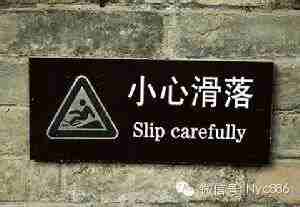这些中式英语这么吊,你造吗?【干货】

☀ 100万华人在关注,全美最火实用公号,每天八编好文分享,关注后回复;菜单,首页,招聘,租房,求助,二手,等海量信息,免费刊登查看,



大家再来看看自己有没有说过吧!下面就是这些 Chinglish 说法,其中每行第一部分是汉语说法,第二部分是 Chinglish 说法,第三部分则是英语的标准说法。
①欢迎你到 ... ② welcome you to ... ③ welcome to ...
①永远记住你② remember you forever ③ always remember you(没有人能活到 forever)
①祝你有个 ... ② wish you have a ... ③ I wish you a ...
①给你② give you ③ here you are
①很喜欢 ... ② very like ... ③ like ... very much
①黄头发② yellow hair ③ blond/blonde(西方人没有 yellow hair 的说法)
①厕所② WC ③ men's room/women's room/restroom
①真遗憾② it's a pity ③ that's too bad/it's a shame(it's a pity 说法太老)
①裤子② trousers ③ pants/slacks/jeans
①修理② mend ③ fix/repair
①入口② way in ③ entrance
①出口② way out ③ exit(way out 在口语中是 crazy 的意思)
①勤奋② diligent ③ hardworking/studious/conscientious
①应该② should ③ must/shall
①火锅② chafing dish ③ hot pot
①大厦② mansion ③ center/plaza
①马马虎虎② so-so ③ average/fair/all right/not too bad/OK(西方人很少使用 so-so)
①好吃② delicious ③ good/nice/tasty/appetizing(delicious 在中国被滥用)
①尽我最大努力② try my best ③ try/strive(try 的本意就是 try my best)
①有名② famous ③ well-known/renowned/legendary/popular(famous 在中国被滥用)
①滑稽② humorous ③ funny/witty/amusing/entertaining
①欺骗② to cheat ③ to trick/to play a joke on/to con/to deceive/to rip off
①车门② the door of the car ③ the car's door
①怎么拼 ? ② how to spell? ③ how do you spell?
①再见② bye-bye ③ bye/see you/see you later/later(bye-bye 有些孩子气)
①玩② play ③ go to/do(play 在中国被滥用)
①面条② noodles ③ pasta(noodles 有些孩子气)
①据说② it is said ③ I heard/I read/I was told
①等等② and so on ③ etc. etcetera
①直到现在② till now ③ recently/lately/thus far
①农民② peasant ③ farmer
① 宣传② propaganda ③ information
英语中 12 个典型的中国式错误
1. 这个价格对我挺合适的。
误:The price is very suitable for me.
正:The price is right.
提示:suitable ( 合适的、相配的 ) 最常见的用法是以否定的形式出现在告示或通知上,如:下列节目儿童不宜。The following programme is not suitable for children. 这句话用后面的说法会更合适。
2. 你是做什么工作的呢?
误:What's your job?
正:Are you working at the moment?
What kind of work are you?
提示:what's your job 这种说法难道也有毛病吗?是的。因为如果您的谈话对象刚刚失业,如此直接的问法会让对方有失面子,所以您要问:目前您是在上班吗?Are you working at the moment? 接下来您才问:目前您在哪儿工作呢?Where are you working these days? 或者您从事哪个行业呢?What line of work are you in?
3. 用英语怎么说?
误:How to say?
正:How do you say this in English?
提示:How to say 是在中国最为泛滥成灾的中国式英语之一,这绝不是地道的英语说法。同样的句子有:请问这个词如何拼写?How do you spell that please? 请问这个单词怎么读?How do you pronounce this word?
4. 明天我有事情要做。
误:I have something to do tomorrow.
正:I am tied up all day tomorrow.
提示:用 I have something to do 来表示您很忙,这也完全是中国式的说法。因为每时每刻我们都有事情要做,躺在那里睡大觉也是事情。所以您可以说我很忙,脱不开身:I'm tied up. 还有其他的说法:I can't make it at that time. I'd love to, but I can't, I have to stay at home.
5. 我没有英文名。
误:I haven't English name.
正:I don't have an English name.
提示:许多人讲英语犯这样的错误,从语法角度来分析,可能是语法功底欠缺,因为 have 在这里是实义动词,而并不是在现在完成时里面那个没有意义的助动词。所以,这句话由肯定句变成否定句要加助动词。明白道理是一回事,习惯是另一回事,请您 再说几话:我没有钱;I don't have any money. 我没有兄弟姐妹;I don't have any brothers or sisters. 我没有车。I don't have a car.
6. 我想我不行。
误:I think I can't.
正:I don't think I can.
提示:汉语里说 " 我想我不会 " 的时候,英语里面总是说 " 我不认为我会 "。以后您在说类似的英语句子的时候,只要留心,也会习惯英语的表达习惯的。
7. 我的舞也跳得不好。
误:I don't dance well too.
正:I am not a very good dancer either.
提示:当我们说不擅长做什么事情的时候,英语里面通常用 not good at something,英语的思维甚至直接踊跃到:我不是一个好的舞者。
8. 现在几点钟了?
误:What time is it now?
正:What time is it, please?
提示:What time is it now 是一个直接从汉语翻译过的句子,讲英语的时候没有必要说 now,因为您不可能问 what time was it yesterday, 或者 what time is it tommorow? 所以符合英语习惯的说法是:请问现在几点了?还有一种说法是:How are we doing for time? 这句话在有时间限制的时候特别合适。
9. 我的英语很糟糕。
误:My English is poor.
正:I am not 100% fluent, but at least I am improving.
提示:有人开玩笑说,全中国人最擅长的一句英文是:My English is poor. 外国人遇到自己外语不好的情况,他们会说 : I am still having a few problem, but I am getting better.
10. 你愿意参加我们的晚会吗?
误:Would you like to join our party on Friday?
正:Would you like to come to our party on Friday night?
提示:join 往往是指参加俱乐部或者协会,如:join a health club; join the Communist Party. 事实上,常常与 party 搭配的动词是 come 或者 go。如 go a wild party,或者 come to a Christmas Party。
11. 我没有经验。
误:I have no experience.
正:I don't know much about that.
提示:I have no experience 这句话听起来古里古怪,因为您只需要说那方面我懂得不多,或者这方面我不在行,就行了。I am not really an expert in this area.
12. ——这个春节你回家吗?
——是的,我回去。
--Will you be going back home for the Spring Festival?
误:--Of course!
正:--Sure. / Certainly.
提示:以英语为母语的人使用 of course 的频率要比中国的学生低得多,只有在回答一些众所周知的问题时才说 of course。因为 of course 后面隐含的一句话是 " 我当然知道啦!难道我是一个傻瓜吗?" 因此,of course 带有挑衅的意味。在交谈时,用 sure 或 certainly 效果会好得多。同时,of course not 也具挑衅的意味。正常情况下语气温和的说法是 certainly not。
常用英语口语绝佳句型 100 句
1. I ’ m an office worker. 我是上班族。
2. I work for the government. 我在政府机关做事。
3. I ’ m happy to meet you. 很高兴见到你。
4. I like your sense of humour. 我喜欢你的幽默感。
5. I ’ m glad to see you again. 很高兴再次见到你。
6. I ’ ll call you. 我会打电话给你。
7. I feel like sleeping/ taking a walk. 我想睡 / 散步。
8. I want something to eat. 我想吃点东西。
9. I need your help. 我需要你的帮助。
10. I would like to talk to you for a minute. 我想和你谈一下。
怎么样你有说过吗,希望你喜欢小沃的整理!

昨日精彩回顾;
1,美国多少钱才算富人?他们每小时都挣多少钱?2,美国社会的潜规则,学不会你就别混了!
3,揭秘海外代购黑幕:假货出国“镀金”变 “直邮正品”
4,2015最值得期待的18部电影大片,有你想看的吗?5,“一碗米养个恩人,一斗米养个仇人”一句话点醒多少梦中人!6,在中国活着,才叫活着7,街头实验;最后戏剧性的一幕!感动众人!!!8,美女,是他干的!跟着感觉走,让你带着我~


猛搓,了解更多信息!
阅读原文 最新评论
推荐文章
作者最新文章
你可能感兴趣的文章
Copyright Disclaimer: The copyright of contents (including texts, images, videos and audios) posted above belong to the User who shared or the third-party website which the User shared from. If you found your copyright have been infringed, please send a DMCA takedown notice to [email protected]. For more detail of the source, please click on the button "Read Original Post" below. For other communications, please send to [email protected].
版权声明:以上内容为用户推荐收藏至CareerEngine平台,其内容(含文字、图片、视频、音频等)及知识版权均属用户或用户转发自的第三方网站,如涉嫌侵权,请通知[email protected]进行信息删除。如需查看信息来源,请点击“查看原文”。如需洽谈其它事宜,请联系[email protected]。
版权声明:以上内容为用户推荐收藏至CareerEngine平台,其内容(含文字、图片、视频、音频等)及知识版权均属用户或用户转发自的第三方网站,如涉嫌侵权,请通知[email protected]进行信息删除。如需查看信息来源,请点击“查看原文”。如需洽谈其它事宜,请联系[email protected]。